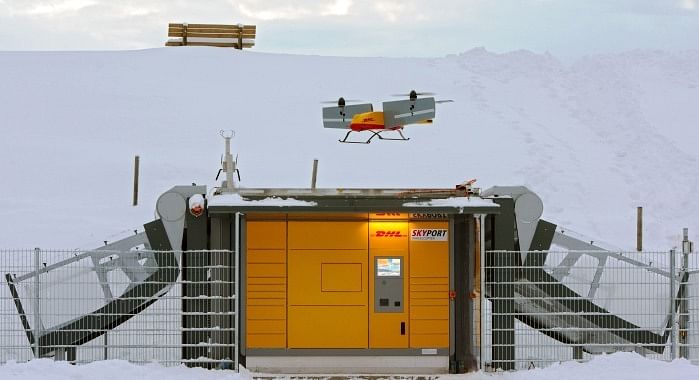ZF ‘Last Mile’ future study: When robots deliver Christmas presents
Fraunhofer Institute researches the future of delivery logistics for major towns | Transport robots to deliver 400 million parcels annually in Germany by 2030.
Delivery drones will probably remain a niche solution, but in just a few years, driving delivery robots will be everyday features, both in major cities and rural regions, according to the third ZF future study, which focuses on ‘Logistics on the Last Mile’.
The Fraunhofer Institute of Material Flow and Logistics (IML) conducted a 360-degree study of customer expectations, statutory and spatial framework conditions as well as technical trends and their impacts.
The Angus steak or frisée lettuce ordered online are changing the face of logistics in cities. Above all in densely populated centers, it is crucial to speed up and smarten up the ‘last mile’. The main customers using e-commerce today are young people in 1- or 2-person households, and this demographic is growing continuously. Customers demand ever-faster delivery, and not just for fresh produce. Same-day delivery is already standard, and the trend is toward same-hour delivery. These demands can only be met with shorter logistics paths. The way forward is to establish local distribution centers and decentralised organization to cut distances to customers.
Consumers in rural areas and medium sized towns also want fast delivery. However, the much lower population density puts huge cost pressure on logistics service providers. With current technology, time-critical services – such as fresh food delivery – are not as viable in these areas.
Prof Dr Ing Uwe Clausen of the Fraunhofer Institute explains: "Transport logistics always has to square the circle between customer requirements, new technologies and spatial as well as political framework conditions." Therefore, growing cost and innovation pressure is not only down to rising consumer expectations. Even today, delivery traffic is already increasingly restricted, regulations for driveline technology are being tightened and access to certain inner-city areas is subject to fees. Therefore, there is an urgent need for an efficient, clean logistics concept for towns and major cities.
Clean, efficient logistics with digital networking
In the future, intelligent algorithms will be able to anticipate orders and transport requirements. Ideally, the merchandise will already be in the direct vicinity of the customer while they are placing their order. Knowledge about consignments and their recipients helps make deliveries flexible and efficient.
The authors of the ZF future study believe that new technologies which enable innovative forms of transport, or even make transport superfluous, will trigger the greatest changes. For instance, 3D printing will enter the mainstream. Additive processes can manufacture many goods on the spot, avoiding time-critical transports. 3D printing shops are one conceivable development, similar to the photocopying shops that thrived back in the days when not every household owned an ink-jet printer.
Transport drones will remain an exception

The study identifies a big role for autonomous driving, although delivery staff will still be necessary. Their job will change, because the transport vehicle will automatically follow them from house to house, to give an example. In rural areas, autonomous delivery vehicles can reduce the high cost pressure on logistics companies struggling with an increasing shortage of drivers. And road-bound transport robots can also be used for the last mile in urban areas. Researchers estimate that up to 400 million parcel deliveries will take place throughout Germany by 2030. Safety concerns, however, will keep transport drones restricted to niche activities.
Electric motors enable overnight transport which occurs quickly and quietly for the last mile. However, at least in the near future, internal combustion engines will remain in use outside the major urban centers. The reasons for this are range and economic constraints.
Logistics is for everybody – not just at Christmas

The ‘last mile’ affects nearly everybody – courier services and transport companies just as much as private and trade customers. This becomes especially clear at Christmas, when up to eight million parcels are delivered to their target locations daily. This is 240% more than usual. Yet on-the-nail delivery logistics is a challenge all year round, in major cities as well as in small towns and rural areas.
Prof Uwe Clausen says, “Taking into account the large number of variables, we identified a number of needs for decision and action.” That is why the study concludes with recommendations for public policy, such as the standardisation of today's diverse regulations for low-emission zones. It also appeals to the logistics industry to grasp the opportunities offered by digitisation.
Third ZF future study
The 2016 ZF future study follows on the heels of two previous studies on long-distance traffic. Fredrik Staedtler, head of the ZF Commercial Vehicle Technology Division, says: “The findings show that the commercial vehicle industry can lead the way in automotive megatrends such as e-mobility and autonomous driving. That's because transport operators need to synchronize customer requirements, framework conditions and available options in a unique way. As a systems supplier, we supply the right solutions for the logistics challenges of the future.”
Euro Transport Media Publishing and Events Company is also involved in the study as a partner. Oliver Trost, managing director of ETM Verlag (ETM Publishing), says: "ZF and the Fraunhofer Institute benefit from our considerable know-how gained through our numerous publications in the commercial vehicle sector. We expected that the courier, express, post service would change significantly and this has now turned out to be true."
All for a good Claus:
- Land Rover builds compact Christmas cabin for Santa
RELATED ARTICLES
BKT, the ‘Off-Road King,’ Chases the Consumer Market
The company has unveiled a broad range of tyres for the Indian two-wheeler and CV markets.
RSB Group Prepares for Hyper-Growth: New Markets, Tech and Mission ₹10,000 Cr
From a small workshop in Jamshedpur to an engineering group with global reach, RSB Transmissions is preparing for its mo...
Beyond Helmets: NeoKavach Wants to Make Rider Airbags India’s Next Safety Habit
As premium motorcycles proliferate and riding culture evolves, an Indo-French venture is betting that wearable airbags, ...






 By Autocar Professional Bureau
By Autocar Professional Bureau
 18 Dec 2016
18 Dec 2016
 10132 Views
10132 Views





 Shahkar Abidi
Shahkar Abidi


 Darshan Nakhwa
Darshan Nakhwa


